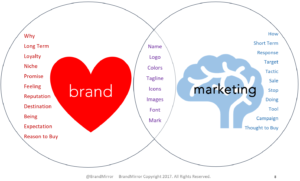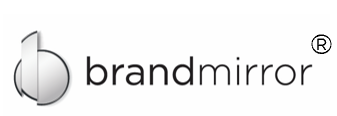Branding and marketing are not the same – and it matters. Many businesses get this wrong – from solopreneurs to well known companies – poor branding is an equal opportunity issue. One of the top issues businesses face is marketing – or at least – that is what owners, marketing managers, and social media managers think. In reality, marketing is usually failing because the brand lacks clarity and what makes a company unique gets lost in translation.
1. Marketing is an Easy Scapegoat (You Don’t Realize It’s Your Brand Hurting You)
The top six challenges that face businesses, according to the Dept. of Labor, includes:
- Finding customers
- Hiring talented people
- Spreading brand awareness
- Building a list
- Lead Generation
- Balancing the quality of your product/service with growth
The reality is that poor branding can drive all of these – because it impacts each one. Marketing can be the easiest scapegoat because maybe your social media just is not converting. In most situations, social media fails because posts are written without the audience in mind and without the best messaging.
2. Branding is Not About You
We can think of amazing brands that have a very clear following and demonstrated loyalty – even crazy commitment.
- Coke vs. Pepsi
- Mac vs. PC
- Apple vs. Android
- Wegmans vs. Whole Foods
- McDonalds vs. Burger King
In reality, when you design your brand, the brand should be informed by a few key things: what pain points are you uniquely solving, who are you solving them for, and who is willing to pay for your solution(s). Brands are not about the company, they are about how a member of your target audience feels when they interact with your brand. For example, people definitely love Coke OR Pepsi – but not usually both. This commitment is an emotional decision (somewhat informed by the brain). Brands drive connection to the heart – if your brand is more about you than your customer, then step back and rethink your brand. A brand is about the heart of the company resonating with the heart of your ideal customer.
to pay for your solution(s). Brands are not about the company, they are about how a member of your target audience feels when they interact with your brand. For example, people definitely love Coke OR Pepsi – but not usually both. This commitment is an emotional decision (somewhat informed by the brain). Brands drive connection to the heart – if your brand is more about you than your customer, then step back and rethink your brand. A brand is about the heart of the company resonating with the heart of your ideal customer.
3. Branding is misunderstood (and for good reason).
A brand is about a purpose, a series of promises, a feeling, and yet it also has to come through in things like your:
- name
- logo
- colors
- tagline
- font
- images and icons
This is where branding gets to be a bit confusing – owners go straight to the name, colors, and logo – oftentimes without defining the true purpose of the company. The tricky part is that this particular list does overlap with marketing – so it is confusing. Here is a visual that can help you see how branding and marketing are different – and where there is overlap.

4. Branding Informs Sales & Marketing
One example of a great brand is Nike, with their slogan “Just Do It”. This example is great because the swoosh is like a check the box, as well as the tagline being a more emotional directive vs. a description of what the sell. Nike delivers a promise that with their products you will be able to “just do it”. When a customer wears Nike it also implies they can “just do it”, that no matter the obstacle they can accomplish their goal and move past the obstacle. Your brand is about the why someone should buy from you – the marketing explains the how they can work with you and what to do next. A brand is a long term vision – where marketing is about driving a short term action and response. Branding informs sales and marketing – because without knowing who to sell to and what message – the sale and the marketing will be much harder to pull off.
When it comes to building a brand, it is about delivering on a promise and expectation to your ideal client, where marketing is more about driving the purchase and engagement. – Jen Dalton
5. Branding is about Helping People to Know, Like, and Trust You
The critical part of building a brand and ensuring it can drive value for your company and your clients include the following:
- Be relevant – talk about things related to your brand
- Be reliable – be consistent in your values, actions, experiences, and evolution
- Build a relationship – have empathy, listen, choose your words carefully, follow up and be present
These all result in a brand’s ability to generate revenue. Determining your brand means you know your customer, you know their pain points, and you know they value what you uniquely offer.
As you plan for 2018, take time to revisit your brand and ensure there is alignment with your sales and marketing strategies. It is critical to validate your brand on a consistent basis with your customers.
Be a noisebreaker, not a noisemaker,
Jen

